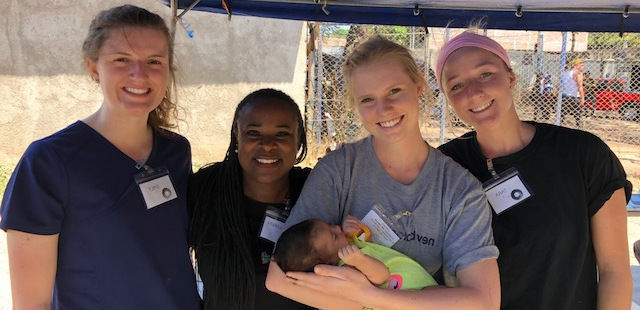Nursing students treat patients in Nicaragua
by Laura Kammerer, laurakam@mailbox.sc.edu
A patient presents with classic signs of hypothyroidism — weight gain, anxiety, cardiac disturbance and constipation — and the solution is deceivingly simple: order a thyroid panel and an electrocardiogram and, if the diagnosis is confirmed, start medication.
But when the patient is seen at a one-day roadside clinic in the mountains of Nicaragua, the solution is less straightforward. Just ask Amanda Eller, a nurse practitioner student who recently returned from a week-long medical mission trip sponsored by One World Health, a Charleston-based non-profit organization.
After examining the young woman, Eller reached out to the group’s coordinator to determine if some extra donor funds could be applied to cover her patient’s blood panel and EKG. The answer was yes, but the good news came with a hitch: the patient would have to visit the main clinic in the city by week’s end to receive the free services.
Eller scheduled the appointment, helped to coordinate patient transportation and hoped for the best. She was thrilled when the patient approached her at the permanent clinic later in the week clutching a paper that confirmed Eller’s hunch.
“It was really exciting to get that satisfaction of follow-up,” Eller said. “After I explained the diagnosis and what it meant, she started crying and said, ‘I feel so relieved to know what’s going on now and why.’”
That patient was one of many whose care required creative thinking from a team of Columbia-based team of health care professionals and USC students from the College of Nursing, College of Pharmacy and School of Medicine.
Throughout a week based in Sebaco, Nicaragua, the team set up five one-day clinics and treated 815 total patients, said Karen Worthy, a clinical assistant professor of nursing who went on the trip. Three Bachelor of Science in nursing students led the clinic’s triage area, including initial patient assessment, while two nurse practitioner students acted as providers and conducted patient visits. Nursing students earned clinical hours for the trip, which is the college’s only endorsed mission trip, she said.
Treating patients in a developing country requires flexibility and innovation, Worthy said, whether the task at hand is assembling a clinic at the side of a road, creating a treatment plan when go-to medications are unavailable or finding novel ways to explain a diagnosis and care plan to a patient when conversation through a translator stalls.
“The students could see that the world doesn’t stop here (in America). What was most impressive to me was their ability to transcend the core values of the College of Nursing to the care they provided to the patients.”
- Dr. Karen Worthy, Clinical Assistant Professor
Senior Emily Davis, of Jacksonville, Fla., said the trip made her appreciate the health care resources in the United States and inspired her to think about how she can contribute to the global health community.
“It’s always an eye-opening experience to go to a place where resource availability and access to health care is much different than we would experience on a daily basis,” she said. “This trip was a good opportunity to learn more about what health care is like in another part of the world.”
Nurse practitioner student Benjamin Keenan said he saw many patients who were dehydrated as well as many parents who came seeking multivitamins for their children, which are expensive in Nicaragua. The trip was his first medical mission trip, but Keenan said he hopes to take such trips regularly.
This year marked the third year nursing students have provided care in Nicaragua, Worthy said. That continuity, which allows the team to provide follow-up care, is key to supporting sustainable care appropriate and sustainable improvements in health and health care for the area because one-off trips are insufficient to solve global health challenges, she said.
“Globalization is fundamentally changing the health equity movement around the world,” Worthy said. “We are creating future nurse leaders who will play a vital role in active problem solving and sparking innovation for advancing worldwide health equity through real and sustainable progress.”
